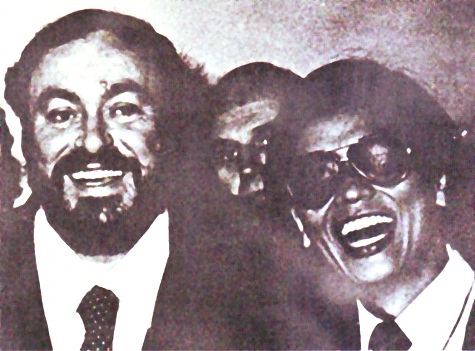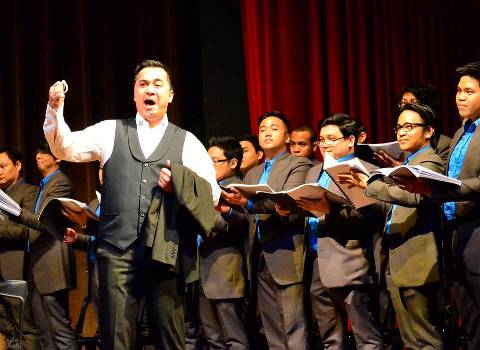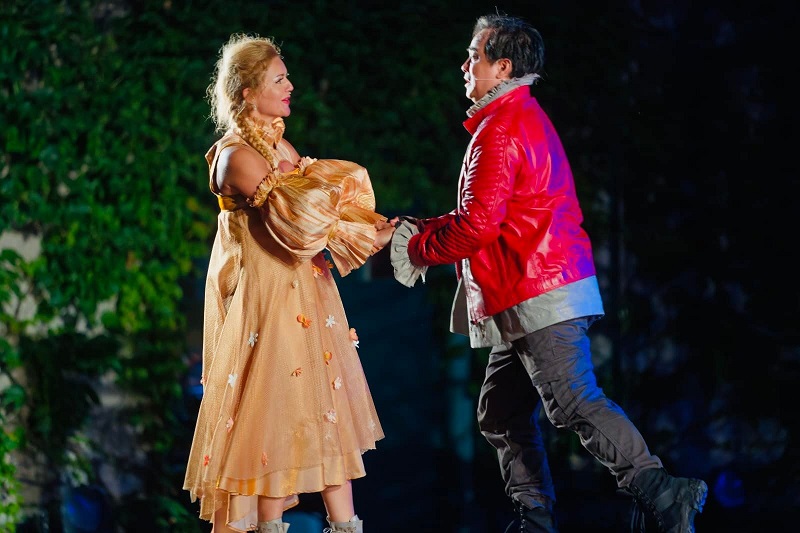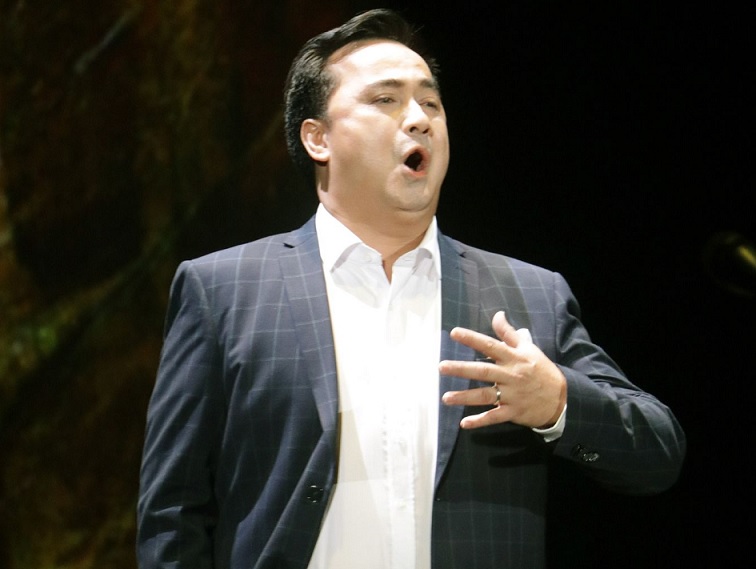BY PABLO A. TARIMAN
Photos by KIKO CABUENA
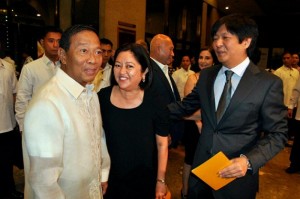 VICE-PRESIDENT Jejomar Binay called for more opera diplomacy to improve and sustain friendly ties between the Philippines and Italy.
VICE-PRESIDENT Jejomar Binay called for more opera diplomacy to improve and sustain friendly ties between the Philippines and Italy.
The Vice-President pointed this out in the opening of Rossini’s Barber of Seville at the CCP Friday night which saw both Filipino and Italian artists in the cast.
“What we cannot achieve through the usual channels, I think opera might be a more viable and musical alternative,” added Binay who recounted his recent fruitful visit in Italy with his wife, Dr. Elena Binay.
Cultural exchange is just one of the subjects of several bilateral agreements between the Philippines and Italy since 1947.
With CCP president Raul Sunico announcing a banner year for opera at the CCP, the Italian Ambassador, H.E. Luca Fornari followed suit by declaring 2012 as the Year of Italian Operas in the Philippines.
He noted that the last three productions – Madama Butterfly, La Traviata and Barber of Seville – were all written by Italian composers.
The Italian ambassador noted that in 1822 when Rossini was just 30 years old, Beethoven wrote to him thus: “Ah, Rossini. So you’re the composer of The Barber of Seville. I congratulate you. It will be played as long as Italian opera exists. Never try to write anything else but opera buffa; any other style would do violence to your nature.”
The recent opera production – courtesy of the Philippine Italian Association headed by Nedy Tantoco and the CCP — was also a celebration of 65 years of Philippine-Italian diplomatic relations which was established on July 9, 1947.
Barber of Seville — which opened to full house at the CCP – had many things going for it and a few disconcerting elements.
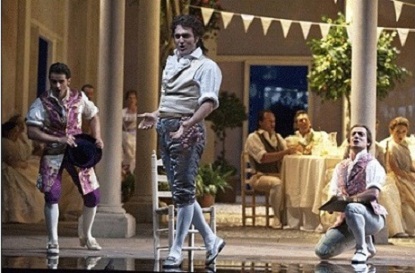 The best part of the production was Italian baritone Mario Cassi (as Figaro) who sang his first act aria, “Largo al factotum della città” with such astounding vocal magic.
The best part of the production was Italian baritone Mario Cassi (as Figaro) who sang his first act aria, “Largo al factotum della città” with such astounding vocal magic.
A prizewinner of several competitions — Toti Dal Monte” in 2002, the “Viotti” 2002 (special Prize Cesare Bardelli), the Plácido Domingo Competition – Operalia 2003 (Zarzuela Prize), the Spiros Argiris 2004 (2nd Prize) — Cassi wasn’t just an exquisite singer but a highly versatile actor as well.
Equally in the league of Cassi was Filipino tenor Arthur Espiritu who sang the first act aria “Ecco ridente in cielo” with such profoundly moving tenderness he was the talk of opera lovers during the intermission. Equally commendable was the Don Basilio of Andrew Fernando, the Fiorello of Noel Azcona and the Rosina of Rachelle Gerodias.
Another big plus was the superb ensemble support of the UST Singers especially in the tenor’s act one aria and the act 1 finale, “Ehi, and de casa! bouna gente!”
The Philippine Philharmonic was on the whole competent but in the hands of Ruggero Barbieri, one couldn’t help but notice the slow, almost dragging, reading of the overture which was supposed to help build excitement for the rest of the opera. In some parts, the overture read like an overextended adagio.
Meanwhile, the direction of Antonio Petris including his set design was in good taste. He gave the audience something to remember when the opera ended in the old style picture-taking reminiscent of chemical photography. The photo session started with blinding flash and with smoke emitting from the camera stand.
Those were the good old days indeed.
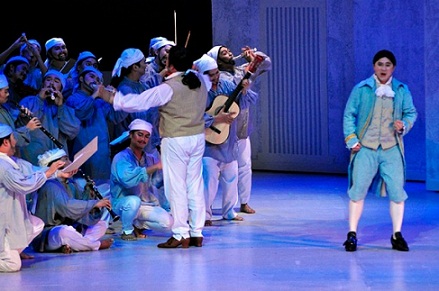 Like it or not, Barber of Seville recalled the early opera-going days of the Filipinos when TV and internet were still unheard of.
Like it or not, Barber of Seville recalled the early opera-going days of the Filipinos when TV and internet were still unheard of.
For the record, the visit of Italian opera companies at the turn of the century peaked in the 1920s and 30s with the emergence of first-rate Filipino singers invading Italian opera houses.
Italy’s operatic star of the 1920s and 30s, soprano Amelita Gulli-Curci, was already heard at the Manila Metropolitan Theater and appeared in several operatic productions with the Philippines’s foremost bass baritone, Jose Mossessgeld Santiago Font who is the first Filipino singer to sing at La Scala di Milan.
In the 50s, Italian singers sang and taught in Manila among them Pavarotti’s idol, Ferruccio Tagliavini and Arrigo Pola.
Renata Tebaldi, supposedly Maria Callas’s fierce rival, sang in Manila in the 70s
The Italian goddess of opera, Renata Tebaldi sang at the Philamlife Theater and so did Franco Corelli
Indeed, there was a time in the past when Manila was referred to as the “Milan of the Orient” because of the proliferation of opera productions and the emergence of world-class Filipino operatic talents.
Recalled baritone Nomer Son who has witnessed the golden age of opera not just in the Philippines but also abroad.
He notes the currency exchange rates in the 50s (P2 to $1) and the time when he could watch first class opera productions abroad.
Baritone Son recalled: “When I was studying in the United States in the late 50s, I could buy a box ticket to watch Zinka (Milanov), (Renata) Tebaldi, Rise Steven, Jan Peerce, Mario del Monaco and many others at the old Metropolitan Opera House in New York for P15.00 ($7.50). However, it cost only P5.00 to watch at 10:00 am after my Sunday ROTC at UST to walk over to Morayta to see all of Pola’s performances at FEU Theater. There, on another Sunday, I also saw the only opera starred and produced by Jose Mossesgeld Santiago Font: ‘Faust’ also for 5 bucks. At about the same time, a third-run movie house along Echague in Quiapo, repeatedly showed the movie ‘Faust’ starring Ferrucio Tagliavini with Italy Tajo as Mephistopheles. I saw all the reruns which at P0.50 was a steal.”
Tajo was last heard in Manila in 1979 as the Sacristan in Tosca at the CCP with Placido Domingo and Eva Marton in the lead roles.
Indeed, the Filipino-Italian musical ties go back a long way even before the advent of Armani suits and Prada bags.
